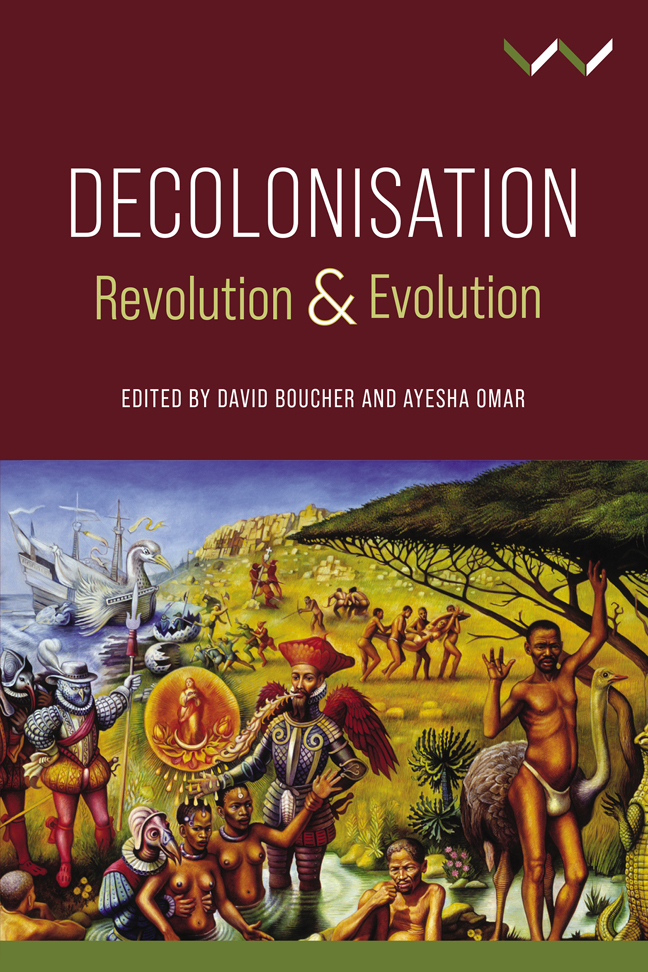Book contents
- Frontmatter
- Contents
- Acronyms
- Introduction: Decolonisation: Interdisciplinary Perspectives
- Chapter 1 The Invention of Blacks: Notes on Conquest, Fear and Time
- Chapter 2 The Decolonisation of Southern Africa: Historical Reflections
- Chapter 3 The Border of Trust at Kat River for Coloured Settlers, 1851–1853
- Chapter 4 Decolonisation and the Enduring Legacy of Colonial Borders in Africa
- Chapter 5 Fanon's Challenge: Identity, Recognition and Ideology
- Chapter 6 Beyond Redemption: Unsettling Progressive-Romantic Storyings of Colonial Injustice in Western Critical Thought
- Chapter 7 The Limits of Decolonisation and the Problem of Legitimacy
- Chapter 8 Decolonisation – Real and Imagined
- Chapter 9 Decolonisation and the Crisis of African Literature in the Twenty-First Century
- Chapter 10 Pedagogical Disobedience in an Era of Unfinished Decolonisation
- Contributors
- Index
Chapter 5 - Fanon's Challenge: Identity, Recognition and Ideology
Published online by Cambridge University Press: 01 March 2024
- Frontmatter
- Contents
- Acronyms
- Introduction: Decolonisation: Interdisciplinary Perspectives
- Chapter 1 The Invention of Blacks: Notes on Conquest, Fear and Time
- Chapter 2 The Decolonisation of Southern Africa: Historical Reflections
- Chapter 3 The Border of Trust at Kat River for Coloured Settlers, 1851–1853
- Chapter 4 Decolonisation and the Enduring Legacy of Colonial Borders in Africa
- Chapter 5 Fanon's Challenge: Identity, Recognition and Ideology
- Chapter 6 Beyond Redemption: Unsettling Progressive-Romantic Storyings of Colonial Injustice in Western Critical Thought
- Chapter 7 The Limits of Decolonisation and the Problem of Legitimacy
- Chapter 8 Decolonisation – Real and Imagined
- Chapter 9 Decolonisation and the Crisis of African Literature in the Twenty-First Century
- Chapter 10 Pedagogical Disobedience in an Era of Unfinished Decolonisation
- Contributors
- Index
Summary
In contemporary political theory, the issues of identity and recognition have come to occupy a central place in what had become an obsession with liberalism and social justice. Recently, Amartya Sen has argued that any person who has pre-eminent and grand identities imposed upon them is deprived of other identities that may be as important, if not more so, to whom they think they are. Sen contends that we must insist upon the freedom to conceive ourselves as we would like others to see us, and to decide upon the relative value we attach to membership of the different groups and cultures to which we choose to belong (Sen 2005, 107).
The concept of recognition is integral to this identity formation and the freedom to choose. It is a concept that shoulders a heavy burden in modern political theory and has become the cornerstone of discussions relating to individual, cultural, sexual and state authenticity, as well as to the acknowledgment and conferment of rights (Boucher 2011; Modood 1998, 2013). One might insist, with Hannah Arendt, on the rejection of the universalism of natural rights, and instead, as citizens and members of groups that comprise multicultural citizenship, on the right to have rights (Arendt 1968).
Recognition is about having a voice, and having that voice heard; an authentic voice that expresses a self-reflective sense of the self, an identity in relation to others, rather than an identity that others impose. In Charles Taylor's view, to misrecognise someone, that is, to impose an identity on someone, is a form of oppression (Taylor 1992, 1999). On the other end of the political spectrum, recognition is the central concept in Francis Fukuyama's championing of liberalism as the only ideology capable of satisfying the basic human need for equal recognition – a struggle for which has characterised human history from the beginning of time (Fukuyama 2018, xiii–xv).
Colonialism is perhaps the most extreme form of identity destruction and the imposition of alien identities designed to deprive peoples of their dignity, language, history, rights and cultural heritage. At the beginning of the First World War, 90 per cent of the world was either occupied by imperial powers or colonised by their settler communities (Young 2001, 2).
- Type
- Chapter
- Information
- DecolonisationRevolution and Evolution, pp. 121 - 142Publisher: Wits University PressPrint publication year: 2023

